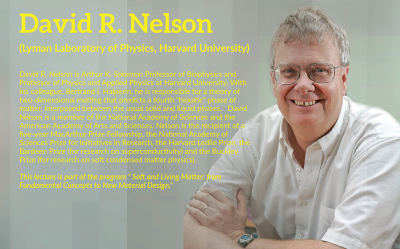Understanding deformations of macroscopic thin plates and shells has a long and rich history, culminating with the Foeppl-von Karman equations in 1904, a precursor of general relativity characterized by a dimensionless coupling constant (the "Foeppl-von Karman number") that can easily reach vK = 10^7 in an ordinary sheet of writing paper. However, thermal fluctuations in thin elastic membranes fundamentally alter the long wavelength physics, as exemplified by experiments that twist and bend individual atomically-thin free-standing graphene sheets (with vK = 10^13!) With thermalized graphene sheets, it may be possible to study the quantum mechanics of two dimensional Dirac massless fermions in a fluctuating curved space whose dynamics resembles a simplified form of general relativity. We then move on to analyze the physics of sheets mutilated with puckers and stitches. Puckers and stitches lead to Ising-like phase transitions that strongly affect the physics of the fluctuating sheet. Thin shells with a background curvature that couples in-plane stretching modes with the out-of-plane undulation modes, lead to qualitative differences between thermalized spherical shells compared to flat membranes.
About the speaker: David R. Nelson is Arthur K. Solomon Professor of Biophysics and Professor of Physics and Applied Physics at Harvard University. He received his Ph.D. in 1975 from Cornell University. With his colleague, Bertrand I. Halperin, he is responsible for a theory of two-dimensional melting that predicts a fourth "hexatic" phase of matter, interposed between the usual solid and liquid phases. Nelson's research also includes a theory of the structure and statistical mechanics of metallic glasses and investigations of "tethered surfaces”, which are two-dimensional generalizations of linear polymer chains. In addition, Nelson has studied flux line entanglement and pinning in high temperature superconductors, where at high magnetic fields, thermal fluctuations cause regular arrays of vortex lines to melt into a tangled spaghetti state. Much of Nelson's recent research has focused on problems that bridge the gap between the physical and biological sciences, including genetic demixing in microorganisms, single molecule biophysics and the structure of viruses.
David Nelson is a member of the National Academy of Sciences, the American Academy of Arts and Sciences and a Fellow of the American Physical Society. He has been an A. P. Sloan Fellow, a Guggenheim Fellow and a Junior and Senior Fellow in the Harvard Society of Fellows. Nelson is the recipient of a five-year MacArthur Prize Fellowship, the National Academy of Sciences Prize for Initiatives in Research, the Harvard Ledlie Prize, the Bardeen Prize (for research on superconductivity) and the Buckley Prize (for research on soft condensed matter physics).
This lecture is part of the program "Soft and Living Matter: from Fundamental Concepts to New Material Design".


